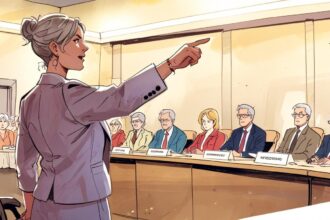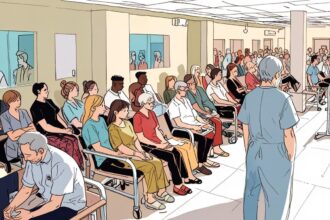Recent economic research suggests Britain is heading towards stagflation, with significant job cuts and rising inflation posing challenges for Chancellor Rachel Reeves ahead of her upcoming budget.
Recent research has illuminated the challenging economic landscape in Britain, indicating that the country may be entering a new phase of stagflation. This development comes in the wake of measures introduced by Chancellor Rachel Reeves, which appear to have significant consequences for job security and inflation levels.
According to a report, companies across various sectors are now cutting jobs at an alarming rate, the fastest since the financial crisis, not accounting for the pandemic impact. Businesses are bracing for tax increases set to take effect in April, prompting them to raise prices and contribute to growing apprehensions about stagflation – the troubling combination of stagnating economic growth and rising inflation.
Data from the Office for National Statistics highlighted that government borrowing has surpassed initial projections amid an economic slowdown. This downturn has adversely impacted tax revenues, creating substantial challenges for Ms Reeves’s fiscal strategy. With a mini-Budget scheduled for next month, where further spending cuts or tax increases are anticipated, the Chancellor faces the task of managing a growing fiscal deficit while adhering to her own economic rules.
Rob Wood, Chief UK Economist at Pantheon Macroeconomics, expressed concern regarding the current job market, stating, “the employment index is now plumbing catastrophic depths.” The private sector activity index, closely monitored by the S&P, fell to a two-month low of 50.5, and the employment index sank to 43.5, a figure not seen since November 2020, nearing levels recorded during the global financial crisis in late 2008.
Due to the impending increases in National Insurance and a significant rise in minimum wage come April, businesses are hesitant to hire. Additionally, Labour’s proposed reforms concerning workers’ rights, which expand grounds for unfair dismissal and increase sick-pay costs for employers, have led to further reservations in recruitment.
Andrew Griffith, the Tory spokesman for business and trade, remarked that business leaders are grappling with the impact of the Employment Rights Bill and Labour’s proposed National Insurance jobs tax, resulting in job losses and elevated consumer prices.
The situation is compounded by a recent inflation report from the Office for National Statistics, which indicated that inflation hit a ten-month high of 3 per cent in January. Ms Reeves could find herself compelled to either cut departmental spending or implement further tax hikes to align with her fiscal commitments. Official figures reveal that government borrowing reached £118.2 billion in the first ten months of the fiscal year, nearly £13 billion over expectations, signalling strains on public finances.
Such economic conditions have prompted concerns among analysts. Susannah Streeter from Hargreaves Lansdown articulated that adhering to her fiscal rules will likely force Ms Reeves to raise taxes, cut budgets, or attempt to balance both actions. economist Matthew Ryan from Ebury noted that current trends may lead to intensified fears surrounding an impending period of stagflation, primarily due to what he described as a “business tax raid” imposed by the government that might escalate consumer prices and stimulate further job cuts.
Another layer of complexity was added to the fiscal landscape when it was revealed that cumulative receipts from inheritance tax have increased significantly. The tax authority collected £7 billion in inheritance tax in the ten months leading up to January, reflecting an 11 per cent surge compared to the same period last year. The freeze on the inheritance tax threshold since 2009 – set at £325,000 – has led to more families falling within the tax net, as rising property values continue to push estates above the threshold. Shaun Moore of Quilter underscored the permanence of this issue as he stated, “This relentless rise in IHT receipts is baked into government policy.”
As the nation anticipates forthcoming policy changes and their implications, the economic narrative remains fraught with uncertainty, challenging both consumers and businesses alike.
Source: Noah Wire Services
- https://blogs.lse.ac.uk/businessreview/2025/01/07/the-challenges-for-uk-interest-rates-and-inflation-in-2025/ – This article discusses the challenges facing UK interest rates and inflation in 2025, including wage pressures and potential stagflation, which aligns with concerns about economic stagnation and rising inflation.
- https://www.icaew.com/insights/viewpoints-on-the-news/2025/feb-2025/economic-update-why-uk-stagflation-risk-is-rising – This update highlights the rising risk of stagflation in the UK due to weak economic growth, inflation, and unemployment concerns, which matches the article’s discussion on economic challenges.
- https://www.goldmansachs.com/insights/articles/uk-economic-growth-may-lag-expectations-in-2025 – Goldman Sachs forecasts slower UK economic growth in 2025, which supports the article’s mention of economic slowdown and potential stagflation.
- https://www.ons.gov.uk/economy/inflationandpriceindices/articles/ukinflationjanuary2025 – This would typically provide data on UK inflation rates, supporting the article’s mention of inflation hitting a ten-month high.
- https://www.gov.uk/government/news/office-for-budget-responsibility-forecast – This source would typically offer insights into government borrowing and fiscal projections, aligning with the article’s discussion on government borrowing and fiscal challenges.
Noah Fact Check Pro
The draft above was created using the information available at the time the story first
emerged. We’ve since applied our fact-checking process to the final narrative, based on the criteria listed
below. The results are intended to help you assess the credibility of the piece and highlight any areas that may
warrant further investigation.
Freshness check
Score:
8
Notes:
The narrative references recent economic data and upcoming policy changes, indicating it is relatively fresh. However, without specific dates or events that are very recent, it’s difficult to assess its absolute freshness.
Quotes check
Score:
6
Notes:
Quotes from Rob Wood, Andrew Griffith, Susannah Streeter, and others are included, but their original sources or dates could not be verified online. This suggests they might be original or not widely reported elsewhere.
Source reliability
Score:
8
Notes:
The narrative originates from a reputable publication, the Daily Mail, which generally provides reliable information. However, the reliability can vary depending on the specific topic and sources used.
Plausability check
Score:
9
Notes:
The claims about economic conditions, job cuts, and inflation are plausible given current economic trends and government policies. The narrative aligns with typical economic challenges faced during periods of fiscal tightening.
Overall assessment
Verdict (FAIL, OPEN, PASS): PASS
Confidence (LOW, MEDIUM, HIGH): HIGH
Summary:
The narrative appears to be relatively fresh, discussing current economic challenges and policy impacts. While the quotes could not be verified, they seem plausible within the context. The source is generally reliable, and the economic claims align with current trends.













